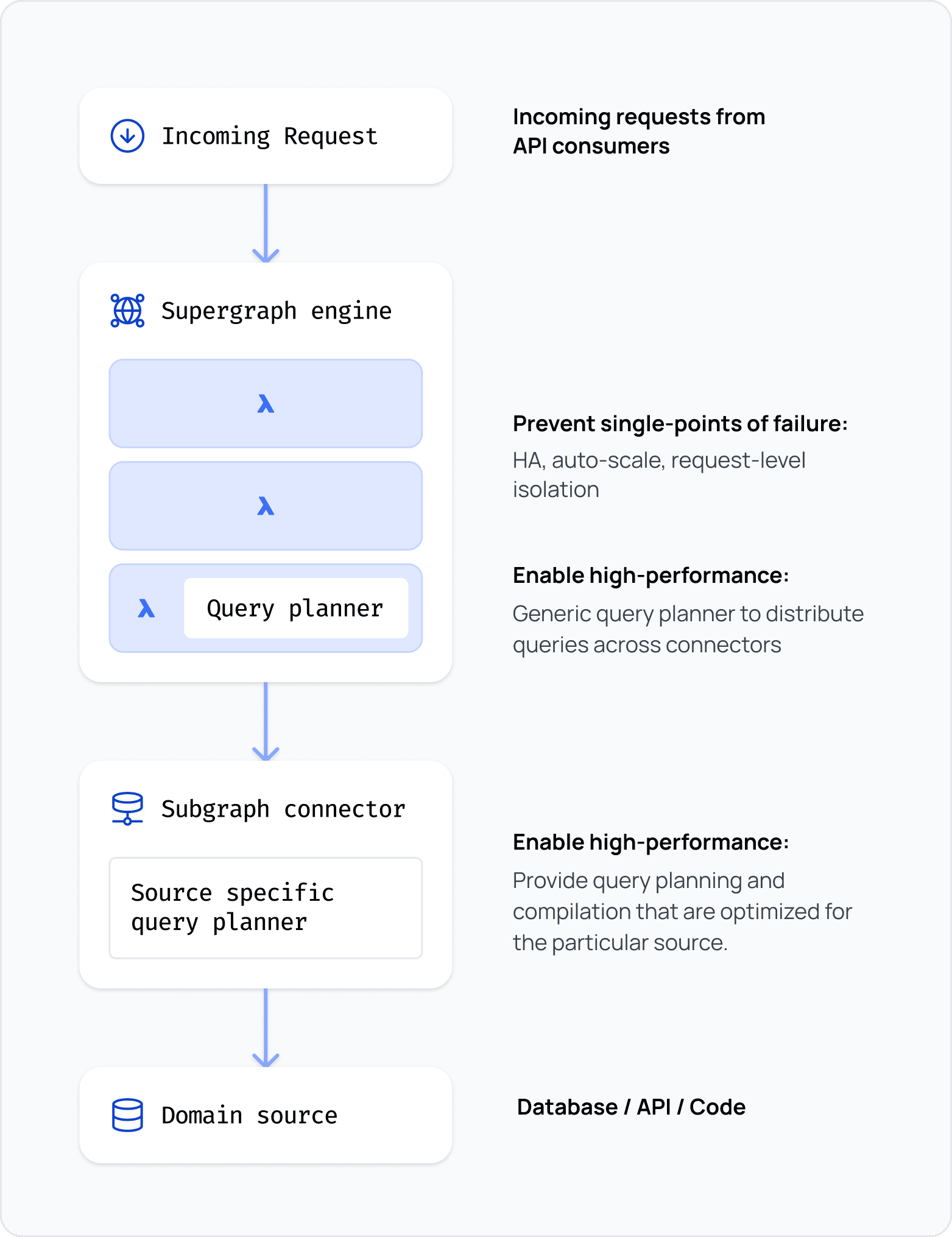Build high-quality GraphQL APIs on Elasticsearch, instantly
GraphQL queries on Elasticsearch
Leverage the full power of GraphQL API to interact with your Elasticsearch database for all your read use cases.
Query exactly what you want from your Elasticsearch index and documents.
Relationships and nesting
The GraphQL API on Elasticsearch handles relationships between indices and queries can be nested to any depth if required.
Pagination
Easily manage large datasets with built-in pagination capabilities. Cursor-based, Relay-style, and offset-based pagination is supported natively.
Filtering
Filter query results on Elasticsearch documents and fields using advanced WHERE clauses and Boolean / logical operators like _and / _or, etc.
Sorting
Sort data based on multiple fields in Elasticsearch documents and specify the sort direction (ascending or descending), making it easy to present your data.
Aggregation (coming soon)
Perform various aggregations to get detailed statistics about your Elasticsearch data directly within your GraphQL queries. Leverage aggregate functions in Elasticsearch like count, sum, min, max, avg, etc.
Vector search
Perform similarity, nearest neighbor vector search using native queries.
query fetchAccountsAndCustomer {
accounts(where: { account_id: { _eq: "AZ2376" } }) {
id
account_id
name
customer {
id
first_name
last_name
zip_code
}
}
}
GraphQL mutations on Elasticsearch
Perform robust data manipulation operations on your Elasticsearch database with GraphQL mutations. Insert, update, or delete data in Elasticsearch via Hasura’s native mutations. (*coming soon)
mutation {
insert_artist(id: 100, name: "New Artist") {
ArtistId
Name
}
}
High-performance GraphQL APIs, at scale
Hasura takes a domain-driven approach to GraphQL, where a GraphQL query is compiled to a query on a domain model (a database query or existing APIs) resulting in superior API performance.
Hasura leverages the goodness of Elasticsearch to create efficient GraphQL queries.
Compile vs. resolve
Hasura avoids the GraphQL N+1 query problem by compiling a query instead of resolving. This compiler-based approach allows Hasura to form a single database query for a GraphQL query of any depth and avoids the N+1 problem in GraphQL.
Predicate pushdown database query Elasticsearch
Hasura filters data at the source with a predicate pushdown of queries to Elasticsearch. Hasura can push down a majority of queries like projection, permissions, arguments, and filtering.

Hasura’s GraphQL APIs are faster than handwritten subgraphs on top of Elasticsearch
Learn more about how Hasura does high-performance domain-driven APIs.
Add caching to existing Elasticsearch APIs for faster response times
Get up to 10x faster API performance on Elasticsearch with end-to-end caching, scaling vertically and horizontally.
Hasura has metadata about the data models across data sources, and the authorization rules at the application level, which helps provide end-to-end caching.
Production-ready APIs on Elasticsearch, from day one
Observability
Monitor for known issues by debugging and analyzing metrics from your Hasura instance.
API security
Secure your Elasticsearch APIs with tools including allow list, multiple JWT secrets, API rate limits, and more.
Authorization
Make granular read and write access control easy to configure on your Elasticsearch database with a built-in authorization engine.
Frequently Asked Questions
Can’t find the answer you are looking for? Reach out to our team, and we can help you select the Hasura plan that’s right for you.
Contact Us
If you have any more questions about pricing, we’re here to help.
Can I use GraphQL with Elastic Cloud?
How can I secure my GraphQL API for Elasticsearch?
Can I combine data from Elasticsearch and other sources in a single GraphQL query?
Can I use GraphQL with existing Elasticsearch databases?
How does Hasura optimize GraphQL performance for Elasticsearch?
Contact Us
If you have any more questions about pricing, we’re here to help.




